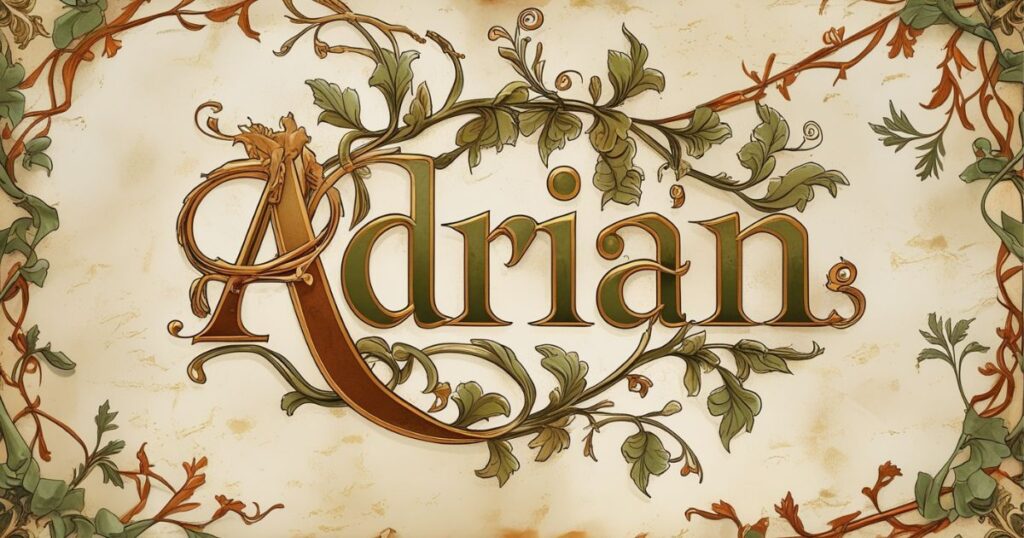Within the tapestry of human history, names have served as more than mere identifiers – they’ve been vessels of meaning, prophecy, and divine purpose.
The biblical meaning of Adrian stands as a testament to this truth, weaving together threads of faith, devotion, and spiritual heritage that span millennia of religious and cultural evolution.
Biblical Meaning of Adrian In a Nutshell

The spiritual essence of Adrian reveals a profound journey through time and faith. Born from the crossroads of Roman, Hebrew, and Greek cultures, this name embodies qualities of faith and devotion that resonate deeply within Christian theology.
During the transformative reign of Roman Emperor Hadrian, the name gained extraordinary significance within the early Christian community.
Though historical records paint Hadrian’s relationship with early Christians as complex and often challenging, the name transcended its imperial origins. It evolved into a powerful symbol of steadfast faith and unwavering commitment to divine truth.
The spiritual heartbeat of Adrian pulses with core virtues that define biblical character: wisdom that guides through darkness, courage that stands firm in adversity, and compassionate leadership that mirrors divine love.
These qualities echo the lives of revered biblical figures like Joseph and Daniel, who maintained their spiritual integrity while navigating the complexities of secular power structures.
Uncovering the Latin Roots
The origin story of Adrian begins in the ancient city of Hadria, a settlement whose influence would ripple through centuries of religious and cultural history.
Nestled near the Adriatic Sea, this Roman municipality didn’t just contribute its name – it provided a foundation for understanding the name’s enduring significance.
Ancient Roman influences shaped not only the name’s linguistic evolution but its cultural weight. As the Roman Empire extended its reach across continents, Adrian became recognized throughout different regions.
Each culture it touched added unique layers of meaning, transforming it from a simple place name into a powerful symbol of leadership and spiritual authority.
The maritime connection through the Adriatic Sea created natural associations with concepts of depth, strength, and far-reaching influence.
These associations would later intertwine with spiritual meanings, creating a rich tapestry of significance that continues to resonate with modern believers.
The Hebrew Connection Explained
Delving into the Hebrew connection reveals profound spiritual depths within Adrian’s meaning. The Hebrew word ‘adar’ carries connotations of nobility and exaltation, while ‘addir’ speaks of strength and might. Together, these linguistic roots paint a vivid picture of divinely appointed leadership and spiritual authority.
This connection to Hebrew language and culture brings forth powerful associations with great biblical leaders like Joshua and David.
These figures exemplified the qualities of courage, faithful service, and spiritual leadership that Adrian has come to represent in religious contexts.
The Hebrew influence adds layers of prophetic significance to the name. Just as ancient Hebrew names often carried divine messages and promises, Adrian bears witness to the potential for human nature to reflect divine character through faithful living and devoted service.
Greek Origins and Significance
The Greek origins of Adrian introduce fascinating dimensions of meaning related to authority and divine power. In Greek mythology, the name shares symbolic connections with Poseidon, representing not just physical strength but also the depth and breadth of spiritual influence.
These Hellenic roots contributed significantly to the name’s adoption throughout the Mediterranean world.
The connection became particularly meaningful along the Adriatic Sea route where the Apostle Paul would later journey, as recorded in Acts 27:1-28:16. This maritime history adds layers of meaning related to journey, mission, and divine guidance.
The Name Adrian in Scripture

Though Adrian doesn’t appear directly in biblical texts, its historical context interweaves beautifully with significant scriptural events.
During the construction of Aelia Capitolina in Jerusalem, the name gained new dimensions of meaning within the early Christian community.
This period marked a crucial transition in Christian history, where faith had to persevere through significant cultural and political changes.
The spread of Christianity along maritime routes, particularly the Adriatic Sea route, contributed to the name’s adoption among early believers.
These sea passages became crucial channels for spreading the gospel, linking Adrian to the expansion of early Christian faith and the courage required to carry divine truth across borders.
Biblical Character Traits Revealed
The spiritual heritage of Adrian illuminates essential qualities of biblical character that resonate through the ages:
| Character Trait | Biblical Expression | Modern Application | Spiritual Impact |
| Justice | Righteous judgment | Ethical leadership | Community transformation |
| Mercy | Compassionate action | Understanding heart | Personal healing |
| Humility | Servant leadership | Selfless service | Spiritual growth |
| Faith | Unwavering trust | Spiritual strength | Divine connection |
| Wisdom | Godly discernment | Informed decisions | Kingdom influence |
Spiritual Significance and Meaning
The spiritual significance of Adrian extends far beyond mere nomenclature into the realm of divine calling.
It represents a holy identity that transcends cultural boundaries, speaking to the universal human yearning for purpose and meaning in an increasingly complex world.
In Christian philosophy, Adrian symbolizes the transformative journey from self-doubt and fear to spiritual liberation.
This transformation mirrors the path of many biblical figures who discovered their divine purpose through faithful obedience and persistent trust in divine guidance.
The name carries with it a promise of spiritual authority tempered by humility, strength shaped by wisdom, and leadership refined by service.
These qualities reflect the highest ideals of Christian character and continue to inspire those who bear the name or study its significance.
FAQ’s
What does Adrian mean biblically?
Adrian connects to noble leadership and faithful service. Though not directly in scripture, it gained spiritual meaning through early Christian history. The name represents strength, wisdom, and devotion to God’s purposes.
What does the name Adrian symbolize?
Adrian symbolizes courage, leadership, and spiritual authority. It combines meanings from Hebrew roots of nobility (‘adar’) and strength (‘addir’). The name represents someone who leads with both power and compassion.
What is the biblical meaning of the name faith?
Faith means complete trust and confidence in God. When connected to Adrian, it represents unwavering belief and dedication to spiritual truth. Together they suggest a person who lives out their beliefs with conviction.
What is the significance of Adrian?
Adrian carries deep cultural and spiritual weight. It links to ancient cities, sea routes, and early Christian history. The name suggests someone destined for meaningful purpose and spiritual leadership.
Is the Name Adrian More Common in Christian or Catholic Communities?
Adrian appears equally in both Christian and Catholic communities. There’s no strong preference for either group. The name transcends denominational boundaries.
How Does the Name Adrian Vary Across Different Cultures and Languages?
The name takes different forms worldwide:
- Spanish: Adrián
- French: Adrien
- Polish: Adrian
- Romanian: Adriàn Each version keeps the core meaning while fitting local language patterns.
Are There Any Notable Historical Figures Named Adrian in the Bible?
The Bible doesn’t directly mention anyone named Adrian. However, Saint Adrian of Nicomedia, an early Christian martyr, became significant in church history. He died defending his faith under Roman persecution.
Can the Name Adrian Be Used for Both Males and Females?
Yes, Adrian works wonderfully for any gender. While traditionally masculine, modern usage welcomes it as a gender-neutral choice. The feminine form “Adrienne” also exists.
Is the Name Adrian More Popular in Modern Times or Historically?
Adrian has stayed consistently popular through history. It saw peaks in ancient Rome and early Christianity. Today it remains a common choice, especially in English-speaking countries.
Conclusion
The name Adrian is way more than just a collection of letters – it’s packed with incredible meaning! Think of it as a bridge between ancient wisdom and modern faith.
At its heart, Adrian means strength and noble leadership, drawing from old Hebrew words that speak of power and dignity.
What’s really cool is how this name has touched so many cultures. From Roman cities to early Christian martyrs, Adrian has left its mark throughout history.
Whether you’re looking at its Latin roots near the Adriatic Sea or its powerful Hebrew connections, the name screams “leadership with a heart.”
Today, Adrian works beautifully for anyone, carrying those same timeless qualities of faith, courage, and devotion. It’s like having a piece of history that still feels totally relevant!
Click Here For More Blog’s:

Sarah Amos is a spiritual guide and author, passionate about exploring inner peace, self-discovery, and mindfulness. Her work inspires readers to connect with their higher selves.
